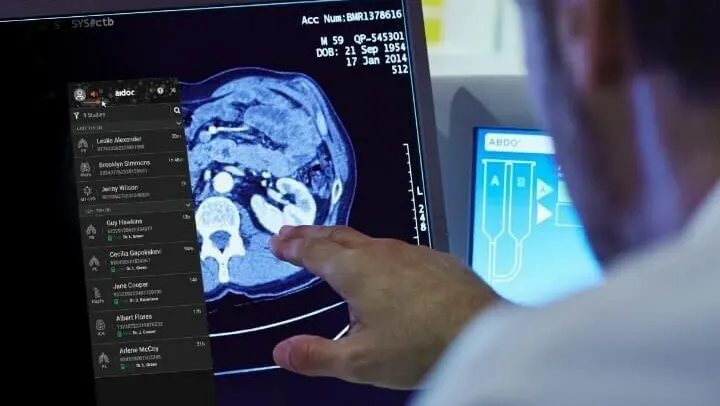Tools & Platforms
Billions Invested, but Productivity Gains Still Elusive

That means that businesses will have to continue to invest billions to avoid falling behind — but it could be years before the technology delivers an economywide payoff, as companies gradually figure out what works best.
Tools & Platforms
New Faculty Member Shiyan Jiang on Bringing AI to Every Classroom
Newswise — As one of Penn GSE’s newest faculty members, Shiyan Jiang is helping expand what AI education can look like—and who it’s for. She doesn’t believe AI should be confined to computer science classes or taught only by tech experts. Instead, she’s designing curriculum and professional learning that help educators across all subjects bring AI into their classrooms in ways that are accessible, meaningful, and rooted in identity. In this Q&A, Jiang shares her vision for inclusive AI education, what drew her to Penn GSE, and why she believes every teacher can be an AI educator.
Q: What first sparked your interest in education and technology?
A: What sparked my interest wasn’t just the excitement of building software or exploring new technologies—it was the realization that technology can transform how we experience learning.
As an undergraduate, I was deeply engaged in developing augmented reality tools that made textbooks come alive—books that didn’t just sit on a desk, but responded to the reader, invited interaction, and sparked curiosity. That experience taught me something powerful: when students can see, touch, and engage with ideas in dynamic ways, learning becomes more meaningful. It showed me that technology, when thoughtfully designed, can be a bridge between what students know and what they could imagine.
Q: Can you share a project or area of research you’re especially excited about right now?
A: I’m especially excited about our work on integrating AI across the curriculum in ways that are accessible, meaningful, and sustainable. We started with a simple but powerful idea: AI should be for all students—not just those in computer science classes. So, we created an AI curriculum for high school English Language Arts. But we soon realized that no single subject can capture the full range of what it means to understand AI. That led us to design short, discipline-specific modules—AI for ELA, AI for math, and AI for history—where each teacher contributes just 3–5 hours from their own subject lens, while students gain exposure to AI from multiple perspectives.
What excites me most now is shifting the narrative: AI doesn’t need to be a separate, specialized topic. It can show up in everyday teaching—through a 5-minute classroom discussion or a full 15-hour unit.
Every teacher has the potential to be an AI educator. So now, my work is focused on supporting teachers in building their AI educator identity, while also studying how students develop their AI learner identities. Because if we want AI education to be truly inclusive, we need to empower every teacher—not just a few—to bring AI into their classrooms.
Q: What drew you to Penn GSE?
A: What drew me to Penn GSE is its bold vision for what education can be. The school’s commitment to interdisciplinary research and leadership in educational innovation aligns perfectly with how I approach my own work—blending AI, data science, and learning sciences to reimagine what’s possible in classrooms.
I’ve long admired the translational work happening at Penn GSE. It’s a place where big ideas are not only welcomed but also supported and scaled. I see tremendous potential to partner with faculty, students, and practitioners at Penn GSE to keep pushing the boundaries of how we think about AI and the future of learning.
Q: How do you hope your work will make a difference for educators or students?
A: I want every student—not just those in computer science classes—to have the opportunity to understand, question, and shape the role of AI in their lives. My work is about making AI education more inclusive and relevant, so that students from all backgrounds can see themselves in AI careers and feel empowered to use data and technology to tackle the issues they care about.
For educators, I hope to remove the barriers that make AI feel intimidating or “not for them.” I design tools, curricula, and professional learning experiences that support teachers in confidently bringing AI into their classrooms—regardless of their subject area or technical background. Because ultimately, if we want AI education to reach all students, we need to equip all teachers to be part of that journey.
Q: What’s something about your research that you wish more people understood?
A: I wish more people understood that education—whether we’re teaching AI, data science, or any other subject—is not just about delivering knowledge. At its core, my research is about creating spaces where students can reflect on who they want to become. When we design learning experiences or build educational tools, the goal isn’t just to teach technical skills—it’s to help students see themselves as capable, curious, and powerful contributors to their communities and the world. Whether they end up working in AI or not, I want students to leave the classroom with a stronger sense of identity, agency, and purpose.
Q: Outside of work, what’s something you’re passionate about or enjoy doing?
A: Outside of work, I love creating creative data visualizations. For me, it’s not just about charts and graphs, but about finding beauty in patterns and helping people see information in new ways.
I’m also a passionate traveler—especially a food traveler. Wherever I go, the first place I want to visit is the local market. I love experiencing a culture through its food: the ingredients, the smells, the way people gather and cook. It’s a joyful and delicious way to connect with people and places.
Q: When you think about the growing role of AI in education, are you more hopeful or concerned—and why?
A: Honestly, my feelings have evolved over time—just like many others navigating this space. There have been moments when I’ve felt incredibly hopeful, seeing all the new possibilities AI opens up for teaching and learning. And there have been moments of concern, especially when I see issues of bias and over-reliance surface.
But I’ve come to realize that this kind of fluctuation is part of the exploration process—it’s normal when we’re working with something so new and transformative. Overall, I consider myself an AI optimist. I believe in engaging with these technologies thoughtfully, trying things out, and learning through doing. For me, it’s not about waiting for perfect solutions—it’s about building better ones through reflection, iteration, and inclusive design.
Tools & Platforms
AI drives medtech investment in 2025

Artificial intelligence companies have been a focus of investment in the medical technology sector so far in 2025. Although the number of funding rounds decreased in the first half of the year, AI startups were favored by investors, according to a recent report by PitchBook. For example, earlier this month, Aidoc received $150 million in funding for an AI foundation model.
AI devices have also been the subject of recent acquisitions. In August, Tempus agreed to buy Paige, a company making digital pathology software, for $81 million. More recently, GE Healthcare built out its AI portfolio with the planned acquisition of brain MRI software firm Icometrix.
Read on for recent deals involving AI-enabled medical devices covered by MedTech Dive:
Tools & Platforms
This country is first in the world to make AI a minister, and its duties are fighting corruption

Albania is making an artificial intelligence-powered digital assistant named Diella its minister, the world’s first artificial intelligence system to serve as a government minister, tasked with overseeing public procurement to eliminate corruption. Albanian Prime Minister Edi Rama announced the appointment this week, promising the AI minister will make Albania “a country where public tenders are 100% free of corruption.Diella, meaning “sun” in Albanian, will manage all government contract decisions previously handled by human officials, ensuring complete transparency in public spending. The AI minister represents a radical shift from traditional governance, with Rama describing her as “the first cabinet member who isn’t physically present, but is virtually created by AI.”
Digital assistant becomes government decision-maker
Diella originally launched in January as an AI-powered virtual assistant on Albania’s e-Albania platform, helping citizens obtain government documents and services. Dressed in traditional Albanian attire, she has already processed 36,600 digital documents and provided nearly 1,000 services to users through voice commands and electronic stamps.The AI minister will now assume responsibility for evaluating and awarding all public tenders, with decisions transferred from human government officials in a “step-by-step” process. This represents a major shift in how governments worldwide might leverage artificial intelligence for governance.
Albanian public skeptical about AI minister’s success
Public procurement has long been plagued by corruption scandals in Albania, a Balkan nation experts describe as a hub for international money laundering from drug and weapons trafficking. Graft has reportedly reached the highest levels of government, complicating the country’s European Union accession goals.Rama aims to lead Albania into the EU by 2030, making anti-corruption efforts crucial for membership eligibility. However, the government provided no details about human oversight mechanisms or safeguards against potential AI manipulation. Public reaction remains mixed, with skeptical Facebook users commenting “Even Diella will be corrupted in Albania” and “Stealing will continue and Diella will be blamed.“The parliament is expected to vote on Rama’s fourth-term cabinet, including the AI minister, when it convenes Friday. Rama won his fourth consecutive term in May elections and has previously advocated for AI as an anti-corruption tool that eliminates bribes, threats, and conflicts of interest in government decision-making.
-

 Business2 weeks ago
Business2 weeks agoThe Guardian view on Trump and the Fed: independence is no substitute for accountability | Editorial
-
Tools & Platforms1 month ago
Building Trust in Military AI Starts with Opening the Black Box – War on the Rocks
-

 Ethics & Policy2 months ago
Ethics & Policy2 months agoSDAIA Supports Saudi Arabia’s Leadership in Shaping Global AI Ethics, Policy, and Research – وكالة الأنباء السعودية
-

 Events & Conferences4 months ago
Events & Conferences4 months agoJourney to 1000 models: Scaling Instagram’s recommendation system
-

 Jobs & Careers2 months ago
Jobs & Careers2 months agoMumbai-based Perplexity Alternative Has 60k+ Users Without Funding
-

 Podcasts & Talks2 months ago
Podcasts & Talks2 months agoHappy 4th of July! 🎆 Made with Veo 3 in Gemini
-

 Education2 months ago
Education2 months agoVEX Robotics launches AI-powered classroom robotics system
-

 Education2 months ago
Education2 months agoMacron says UK and France have duty to tackle illegal migration ‘with humanity, solidarity and firmness’ – UK politics live | Politics
-

 Funding & Business2 months ago
Funding & Business2 months agoKayak and Expedia race to build AI travel agents that turn social posts into itineraries
-

 Podcasts & Talks2 months ago
Podcasts & Talks2 months agoOpenAI 🤝 @teamganassi





